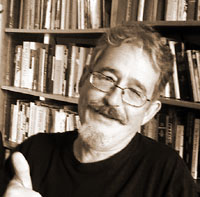Thomas Hardy finds something beyond his idea of reality that gives him hope despite the rigors of crisis and tumult in his poem
The Darkling Thrush, published this week in Slate by poetry editor Robert Pinsky. The scenario here is that the planet is colored by the most dour of moods, seemingly shrouded and engulfed in a corrosive, soul killing pessimism . And yet, amid the foul weather and declining mood, comes a hint of something lighter, a clear wisp of clean air. Hardy seems to have learned that perception is not , by default, fate.
I leant upon a coppice gate
…..When Frost was spectre-gray,
And Winter's dregs made desolate
…..The weakening eye of day.
The tangled bine-stems scored the sky
…..Like strings of broken lyres,
And all mankind that haunted nigh
…..Had sought their household fires.
The land's sharp features seemed to be
…..The Century's corpse outleant,
His crypt the cloudy canopy,
…..The wind his death-lament.
The ancient pulse of germ and birth
…..Was shrunken hard and dry,
And every spirit upon earth
…..Seemed fervorless as I.
At once a voice arose among
…..The bleak twigs overhead
In a full-hearted evensong
…..Of joy illimited;
An aged thrush, frail, gaunt, and small
…..In blast-beruffled plume,
Had chosen thus to fling his soul
…..Upon the growing gloom.
So little cause for carolings
…..Of such ecstatic sound
Was written on terrestrial things
…..Afar or nigh around,
That I could think there trembled through
…..His happy good-night air
Some blessed Hope, whereof he knew
…..And I was unaware.
Confronted with gray, rainy day, a terrain of alienating spires and barren trees, the funeral day is suddenly lit up with the swelling song of the oddly-placed bird. One feels hope, optimism, from an unexpected source. It is a perfect poem for the day as we anticipate the forthcoming Presidential Inauguration .
Optimism isn't the easiest matter to get across convincingly in a poem, but there is something about the arrival of Obama in Washington that calms me more than a little. The reason might be that the new president is willing to stop arguing all the distinctions-without-difference¬es that have all but obscured our dilemma and instead confront our national and cultural issues straight on, without flinching. The point here is that there is some hope from an unexpected source that we may soon have leadership that an older guard was unwilling or unable to produce; whatever happens through this, we seem ready as a country for whatever comes after the collapse of the status quo.
Hardy's ode convinces with its uplift fairly much because his lines are melodic and they swing rather loosely for such a constricted form--there is that feeling, as we catch the beats and the galloping rhymes , that one might get as they struggle forward in a wrestling match; one senses an advantage looming, an opening about to gape widely, and this sudden expectation charges you hard, pumps a bit more adrenaline, takes you over the finish line . Through it, one is exhausted, sore perhaps, but stronger, more confident, in a state where one does not take anything for granted. Hardy seems to point out that nothing gets better without change and change is invariably struggle.
Hardy seems to be talking about the fact that creatures other than man , who have nothing invested in thinking their species special or blessed in any way, have the ability to withstand and transcend trauma, and ironically appear stronger, nobler for the struggle. The song of the thrush is theatrical, a tad melodramatic, but for poetic effect it does serve to remind the author, lately suffering a depressed mood, that life isn't about the all of existence between in place only to confirm, challenge, or test the philosophy he has developed from the gathered wisdom he has read; there is sorrow, of course, but life goes on separate from expectations and personal bitterness and beauty is not only possible despite awful events and traffic circumstances, but in fact exists, plain, clear, unselfconscious. We have the poet here at the moment when a small perception gives rise to an ongoing re-examination of ideas and relations that have sustained one so far and to appreciate the truth that what a cosmology should be a loose fitting suit rather than a tight fit.
Which is to say that Hardy finds himself awakened to the possibility that even as life goes on, it needn't be a grudging trudge, and that one can experience the wider variety of emotional and aesthetic life than before, when one found himself sure of their ideas and knowing everything without experiencing a tenth of what the world has in store.





